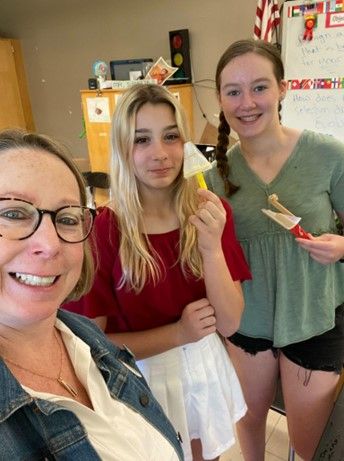Throughout her career, every time Tara Reed has had to give a public presentation, she thinks of one person: Tammy Fay. Reed’s high school biology teacher from some 20 years ago, Fay (who is remembered as Ms. Due) left an indelible impression.
“I was painfully shy when I was younger,” Reed recalls. “But I just remember that Ms. Due gave me that confidence to speak in front of others. Her mentorship boosted my confidence and helped me get out of my shell. I still channel the presentation she helped me through in high school biology.”
And, for the first time since being her student, Reed was able to thank ABE teacher Fay for not only building confidence in her as a young student but also helping to nurture her love of science—a love that would transform into a biotechnology career. Reed worked for 17 years in the biotech industry, nearly 12 of which were in regulatory affairs at Amgen. Reuniting this month, Reed and Fay reminisced and exchanged stories about their teacher–student time at Masconomet Regional High School in Massachusetts, their careers in biotechnology, and the importance of science outreach, especially for young women.
When Reed was Fay’s student, the ABE program did not exist yet in Massachusetts, so Fay had to start from scratch for her biotech class. She remembers spending a lot of time creatively resourcing supplies to run labs. She also remembers Reed: “Tara was a good student who asked great questions. These are honest things I remember. … She developed a passion for the idea of biotechnology. At that time, biotech was a semester-long class, which isn't long enough for developing a passion for most anything, but that was our beginning.”
Fay herself has a special drive toward biotechnology education. She graduated with a degree in biotechnology after feeling disillusioned in her original mechanical engineering major due, in part, to the lack of female peers and mentors. Fay then worked for some time in the biotech industry but became disillusioned again by a perceived glass ceiling that was hard to break in a male-dominated industry. She felt like she would have a greater impact teaching science to young people, girls in particular—giving them the confidence and competence early on to succeed in STEM fields. She decided to return to school to get a degree in education.
Fay’s relationship with Reed embodies the type of impact she was hoping for when she set down the science education path. “In 26 years, I don't even know all of the students who have gone on to pursue science. But I'm so proud when I hear back from them, especially the female students, about their research and science careers. To me, those are the bigger victories than the male students. It means that there's something good that happened in the classroom that made them open to the idea that they can pursue science and be successful.”
For Reed, Fay was a key factor in her pursuit of biotechnology. As a high school student in the early 2000s, Reed recalls that she wasn’t even sure if she liked biology when she first took Fay’s classes. “But Ms. Due was just such an interactive, amazing teacher who always made things very interesting. She made me really want to explore biology further.”
Reed specifically remembers a field trip her class took to a Boston University CityLab, which was the first time she saw a non-medical degree path in science. “It opened up my eyes to what you could do with science outside of those medical and nursing professions,” she says.
Reed would end up majoring in biology in college and when deciding whether to continue on to medical school, she felt “stuck,” she says. “So, I went back to my roots of when I started to get interested in biology with Ms. Due, and what it felt like in her classes, and the experiences she shared about working in biotech… and that’s when I started exploring other opportunities outside of medical school.” Reed would go on to intern at a biotech company, get her master’s degree, and then work at some startup companies before moving to Amgen.
Since when Fay taught Reed, biotechnology and STEM education have evolved greatly, with educators like Fay leading the way. Fay now heads up the science, technology, and engineering department in the Masconomet Regional School District while also working on a doctoral degree in STEM Leadership — with a goal of bringing science outreach to young students in new ways. Just this spring, she worked with a group of seventh graders, teaching them how to micropipette.

Fay works with seventh graders to increase exposure to engineering education
through integrated STEM (May 2023).
Fay says that ABE has catapulted what she and other educators can do with biotechnology in the classroom. “Through ABE, we have built capacity and as educators, we are providing thousands of kids the opportunity to explore biotechnology,” she says. “At my school, we now offer a full-year biotech class, which we're running two sections a year, while making other connections beyond ABE to connect them to science.”
When meeting in May 2023, Reed was excited to get pointers from Fay to help Reed with STEM outreach in her community. “She is a trailblazer in what she's trying to do for young students,” Reed says.
“I think educators are by far the most important part of the system,” Fay reflects. “And I'm not done growing. I'm not done fighting for what our kids need in STEM learning.”
